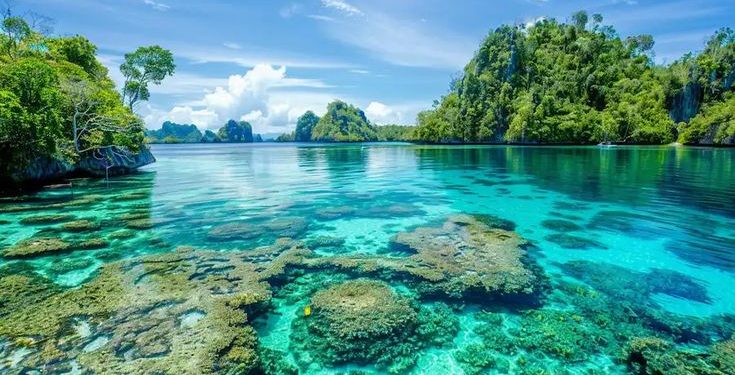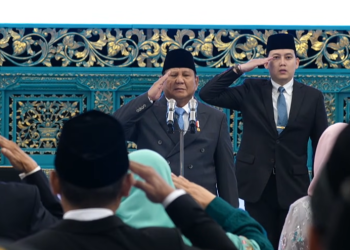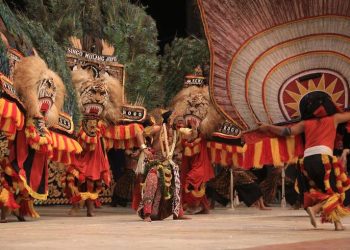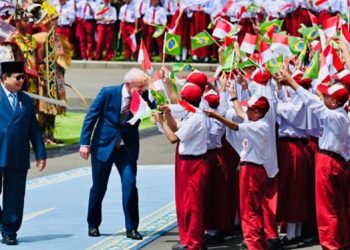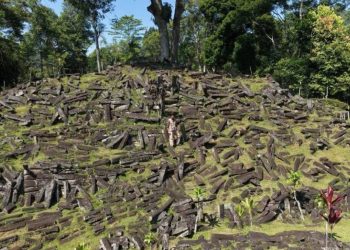Jakarta, Indonesia Sentinel — The Nusantara Nature Conservation Foundation (YKAN), in collaboration with Indonesia’s Ministry of Maritime Affairs and Fisheries (KKP) and several partners, has officially designated the waters of Northern Misool in Raja Ampat, Southwest Papua, as a Marine Conservation Area. The announcement was made during YKAN’s 10th anniversary celebration in Jakarta on Tuesday, November 12, under the theme “Together, We Find a Way.”
Spanning 308,692 hectares, Northern Misool waters in Raja Ampat is ecologically significant as conservation zone, boasting high marine biodiversity. It serves as a crucial habitat for endangered species like dugongs, sea turtles, whales, manta rays, and economically valuable fish stocks.
“Our commitment is to support the government and local communities in safeguarding Indonesia’s marine areas,” said Muhammad Ilman, YKAN’s Director of Marine Programs.
“We have ongoing initiatives in regions like Wakatobi and the Bird’s Head Seascape, where our efforts have led to the establishment of eight community-based ecotourism groups and the collection of seven million data points on demersal fish species using the Crew Operated Data Recorder System (CODRS),” Ilman added.
Expanding Marine Conservation Across Indonesia
YKAN’s marine conservation programs are currently active across 11 provinces and five fisheries management areas in Indonesia, partnering with various stakeholders. These initiatives are built around four strategic pillars: Blue Economy, Sustainable Fisheries Management, Coastal Resilience, and Marine Protected Area Conservation.
Ongoing projects include the implementation of eco-friendly shrimp farming through the Shrimp Carbon Aquaculture (SECURE) initiative in Berau and Ogan Komering Ilir districts, as well as coral reef conservation efforts funded by a debt-for-nature swap agreement valued at $35 million (Rp552.92 billion).
Coastal and Marine Preservation Effort
As the world’s largest archipelagic nation, Indonesia’s coastal and marine regions are vital, supporting the livelihoods of 60% of the coastal population. These areas are also essential for climate change adaptation and mitigation.
However, these critical ecosystems face threats from unsustainable exploitation driven by rising demand for coastal and marine resources. In response, the government, through the KKP, has launched a series of Blue Economy policies that prioritize ecological sustainability.
Track and Identify Online Gambling Websites, Indonesia’s Domain Authority Develops IDADX
These policies include expanding marine protected areas, implementing quota-based sustainable fishing, promoting sustainable aquaculture, managing coastal and small island ecosystems, and tackling marine plastic waste.
“Learning from the successful marine governance transformations in developed nations, we understand that implementing Blue Economy policies in Indonesia comes with complex, multi-dimensional challenges. This process cannot be achieved overnight or in isolation,” said Andy Artha Donny Oktopura, Head of Planning at the KKP.
Andy emphasized that collaboration between the KKP and partners like YKAN is crucial to achieving the “triple win” goals of the Blue Economy in Indonesia: Ocean Health, Ocean Wealth, and Ocean Prosperity, as well as contributing to the Sustainable Development Goals (SDGs).
Herlina Hartanto, Executive Director of YKAN, highlighted that the event served as a reflection on the lessons learned over the past decade while reaffirming their commitment to protecting Indonesia’s coastal and marine ecosystems.
“We’ve learned that strong partnerships and the commitment of all stakeholders are key to the success we’ve achieved together,” Herlina said in her remarks.
As Indonesia continues to prioritize the conservation of its vast marine resources, these collaborative efforts are seen as essential. With the designation of Northern Misool waters in Raja Ampat as marine conservation area, Indonesia ensuring the long-term sustainability of the nation’s marine rich biodiversity and the economic well-being of its coastal communities.
(Raidi/Agung)


